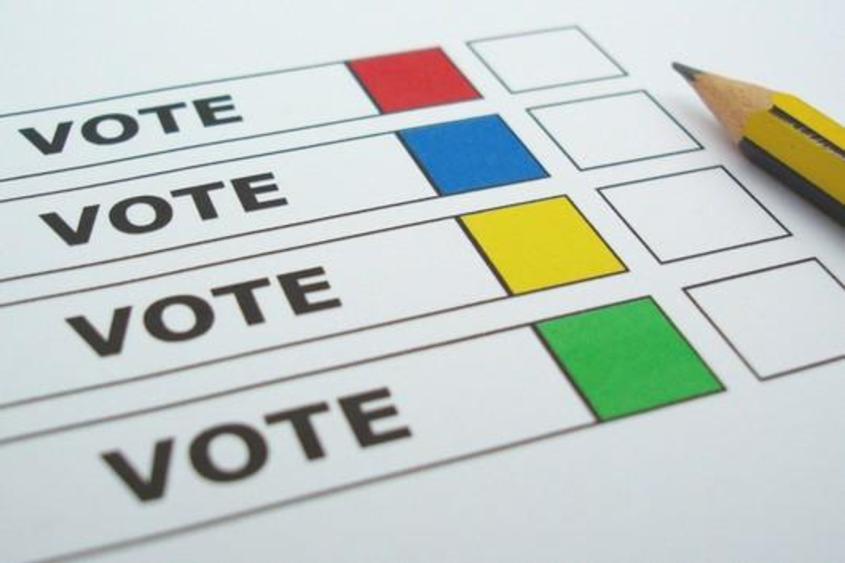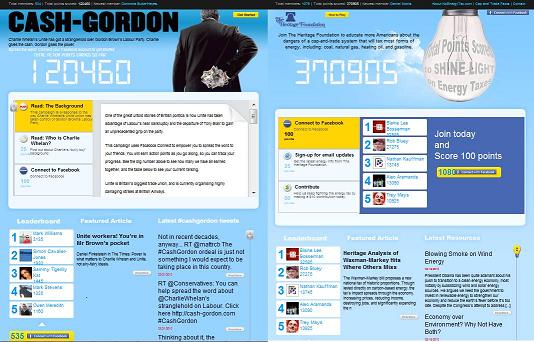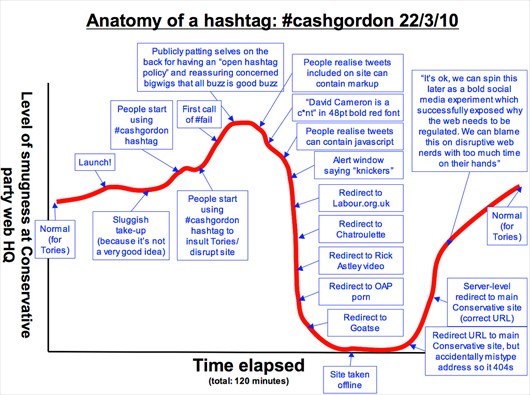Politics 2.0 close
In Musings

The most exciting election in years finally came to an end this month. I didn't hear about our new Prime Minister on the radio, TV or the morning papers, I first heard the news, via a tweet. This seemed to be a fitting way to find out about the outcome of Britian's first Social Media Election. In this post I am going to talk about the various digital initiatives the 3 major parties put into place throughout this election but also, more crucially, the various digital initiatives which everyday people put in place.
The Tory's Cash Gordon website is an example of how dirty politics can go so wrong in this world of social media. The site was planned to be a social media game where Tories were given points for performing tasks such as recruiting friends and reading news articles. If the idea seems a little strange to your marketing ears, that is because this site was shoehorned into a site originally built by the Republican strategists David All Group. It was actually developed to galvanise opposition to Barack Obama's healthcare reforms. Several campaigns have been built into this template without really making any changes. Have a look at no energy tax to see how much customisation a $15,000 pricetag, gets you.
Blatant copying isn't even the biggest oversight of this campaign. As you will notice, it automatically pulls in any tweets with the Hashtag #cashgordon. This is all well and good if people agree with you, but it was only a matter of time before people were tweeting things like "Tories taste like cocks #cashgordon". They really didn't think that through.
So far the Tories aren't scoring high in the 'understanding social media' stakes, but wait, it gets worse. Moments later it was worked out (by people arguably more technologically savvy than the Tories) that html code could be sent via tweets, which would then run on the site. The first piece of code through the system declared in Large Red Type "David Cameron is a Cunt"... the next redirected the site to Rick Ashley's video "never gonna give you up" at this point the Tories were definitely rick rolled.
It was only a matter of time before someone tweeted some code to redirect the Cash Gordon site to a pornographic image of overweight gay OAPs. It was at this point the site was pulled off-line as the Tories went into 'damage limitation' mode. But the story doesn't end there, as far as social media is concerned, this was a triumph for the people who had sabotaged the site. And as often happens in cases like this, at this point the people of the social web move to the next stage, and start to create content. Within hours of this event there were hundreds of tweets / blog posts and satirical info graphics. Thus ensuring that this whole mess was spread even further around the web. One massive own-goal to the Tories.
Record numbers turned out for this election, I think this is down to the electorate being more informed about the candidates that they are voting for. The websites They Work For You and the Guardian's election 2010 site were able to strip away the legal language of the Parliamentary record, and tell you the voting record of any MP in simple terms For example, are they for or against the war on Iraq, are they for or against equal gay rights, and a dozen other key issues of the past 5 years. This meant for the first time "the man on the street" was informed enough to be able make their local member accountable for how they have voted on key issues important to them.
Voter Power finally put an end to the pub conversations which start with "it doesn't matter who I vote for". This site lays out in simple graphs how safe your local seat is, constituency size and percentage of discarded votes. I do wonder if this site was enough information for people from "Sheffield Brightside & Hillsborough", (where they have the voting power of 0.253 of the Average UK resident) to "Afron" (where they have the voting power of 1.308 of the Average UK resident)
The site My Gay Vote was one of many niche sites which popped up informing voters on individual issues. All this information was delivered in bite sized chunks, designed to fit into 140 characters. As all campaigners tried to encourage the masses to share their message they became painfully aware that a tweet can move faster and is less accountable than a newspaper article. Negatively, depth of analysis is lost in a tweet culture where everything is reduced to black or white. Most of these sites don't show the source of their data and aren't "authorised" by a political party, which means that someone with a little Search Engine Optimisation experience can have an equal footing online.
Britain loves the underdog, and came out in force to defend Nick Clegg when he was attacked at the beginning of the campaign by the right wing tabloids. All over Twitter the ironic #nickcleggsfault Hashtag was attached to everything from "I have lost one of my socks #nickcleggsfault" to "Ash cloud is covering England again #nickcleggsfault". The irony of this is that when the parliament was hung and Nick Clegg assumed the role of King-maker, the #nickcleggsfault Hashtag made a resurgence, this time without the irony.
In a digital landscape where MP's records are easily digestible and where constituents are vocal in announcing their views and influencing their followers, does this mean people are going to stop voting along party lines and continue the march away from the two party system?

